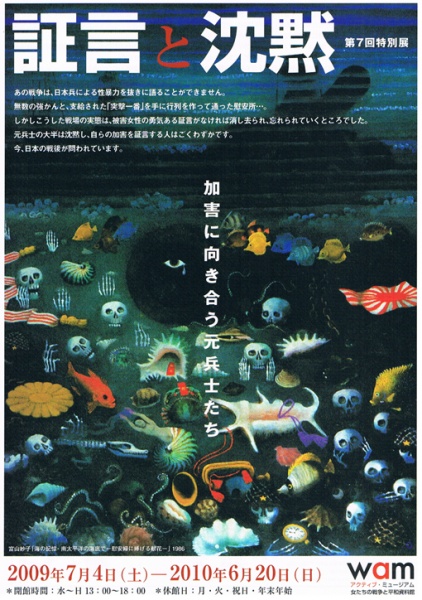The 7th Special Exhibition: Testimony and Silence – former soldiers facing up to their crimes

The battlefield was fraught with cases of brutal sexual assault. Holding their military-issued "Attack No.1" condoms, the soldiers queued up, waiting their turn outside the so-called comfort station. The war that our own fathers and grandfathers experienced simply cannot be discussed without mention of sexual violence. In testimonies collected over twenty years, the courageous survivors of wartime sexual violence have spoken out about this reality. In contrast, very few former Japanese soldiers have spoken out about their own violence.
How do these men talk about rape and "comfort stations", and how do they not talk about it? Having returned home from the misery of wartime hunger and disease, do these soldiers think of themselves as nothing other than "victims" of the battlefield? This exhibition offers an insight into Japan’s post-war indifference to its wartime and post-war responsibilities, focusing especially on its sexual violence.
Exhibition contents:
- How has Japan’s wartime sexual violence been described and recorded?
- How has sexual violence been judged in various tribunals, including:
- The post-war Tokyo Tribunals and trials of Class B and C war criminals;
- Trials in the1990s initiated by the victims of Japan’s wartime sexual violence, seeking compensation for damages; and
- The Women’s International War Crimes Tribunal on Japan’s Military Sexual Slavery in the year 2000.
- ‘Comfort stations’ and rape on the battlefield: through memorandums and memoirs from former soldiers and other war literature.
- Japanese soldiers and women of the battleground, as portrayed in movies.
- Former soldiers from the Fushun War Criminals Management Centre and the China Returnee Liaison Group: How have they come to face their own personal violence?
- Former soldiers testifying about their crimes: in China, Burma, The Philippines, East Timor, etc.
- Survivors testifying about the sexual violence suffered: in South Korea, North Korea, Taiwan, The Philippines, Indonesia, Malaysia, Holland, East Timor, and Japan.
- Peace museums and war museums throughout Japan: the outcomes of WAM’s questionnaire research regarding the exhibitions on Japan’s wartime aggression conducted by national public museums; and the efforts of private museums to reveal Japan’s wartime aggression.
- Memorandums, war-comrade club newsletters, albums, and "Attack No.1" (military-issued condoms) from the soldiers.
